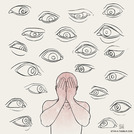
Mental health information surrounding social anxiety disorder.
- Subject:
- Health, Medicine and Nursing
- Psychology
- Social Work
- Material Type:
- Reading
- Author:
- Taylor Crawford
- Date Added:
- 05/02/2022

Mental health information surrounding social anxiety disorder.
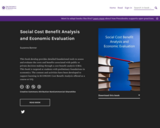
Short Description:
This book provides detailed foundational tools to assess and evaluate the costs and benefits associated with public or private decision making through a cost-benefit analysis (CBA). This book is targeted at students with preliminary foundations in economics. The content and activities have been developed to support learning in ECON2101 Cost Benefit Analysis offered as a course at UQ.
Word Count: 79884
ISBN: 978-1-74272-370-9
(Note: This resource's metadata has been created automatically by reformatting and/or combining the information that the author initially provided as part of a bulk import process.)
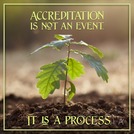
Social Emotional Learning is considered the most important topic in Education.

This activity aims to help student groups in an undergraduate macro social work course understand what a social problem is, how to reimage issues that affect a group of people, research the magnitude of the problem, and develop a workable solution. It also gives students practice experience working in groups and using TEAMS demonstrating leadership skills as each collaborates on research and development of the social problem report.
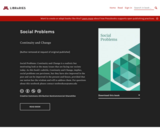
These texts have virtually the same content. Both books contain ADMJ content that could be useful for multiple courses (especially AJ160). Original publisher and author were requested to be removed. University of Minnesota Libraries Publishing adapted this resource.
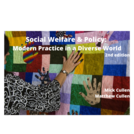
This text is intended for use in introductory social work classes at the college level. Chapter topics include the foundations and history of social work and social welfare; generalist social work; ethics and values; social policy; race & ethnicity; sex, sexism, & gender; LGBTQ+ clients; poverty and financial assistance; school social work; families and children; healthcare and disabilities; substance use; mental health; criminal justice; and older clients. Mick Cullen, LCSW, CADC, MA, is a professor and chair of the social work/human services department at College of Lake County in Grayslake, Illinois. Matthew Cullen, LICSW, LCSW, M.Ed., is a counselor at Green River College in Auburn, Washington.
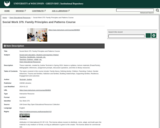
These materials, created by Justine Terzinski in Spring 2024, feature a syllabus, lecture materials (PowerPoints), bibliographic references, assignment prompts, discussion questions, and links to library resources.
The topics covered in this course include: Family theory; Defining family; Children; Parenting; Culture; Gender influences; Trauma and families; Addiction and families; Building relationships; Supporting families; Resilience; Engagement and outcomes
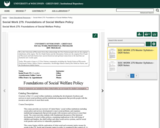
In this syllabus from Fall 2022, Dr. Joan Groessl provides bibliographic citations and annotations for resources used in place of a traditional textbook. These resources include a combination of freely available resources; research, articles, and chapters supplied by the UWGB Libraries; and fair use of traditionally copyrighted materials.
Course topics include: Defining Social Welfare & Its Orientation; Defining Social Policy; Social Welfare Policy in the US ; Social Policy & Social Justice; US Legislative Structure; Race, Discrimination & Oppression in Policy; Understanding Approaches to Poverty; Focus on Women, Children, & Families; Focus on Health Care; Focus on Mental Health & Substance Abuse; Policy Directions: Criminal Justice, Child Welfare, Housing & Accessibility, Food Insecurity, Climate, Aging; International Connections
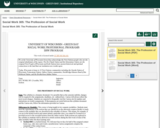
In this syllabus from Fall 2023, Dr. Jolanda Sallmann provides bibliographic citations and annotations for resources used in place of a traditional textbook. These resources include a combination of freely available resources; research, articles, and chapters supplied by the UWGB Libraries; and fair use of traditionally copyrighted materials.
Course topics include: An Overview of the Course, the Social Work Curriculum, and the Profession; Basic Themes of the Social Work Program ; Social Work as a Helping Profession; Writing Workshop; History of the Social Work Profession; Introduction to CSWE Competencies & the BSW Program; Mini Writing Workshop: Pronouns; Orientation to Social Work: Code of Ethics and Student Handbook; The Social Work Profession: Purpose, Sanction, Knowledge, and Values; Generalist Practice; Social Work Roles; Ecomaps & Genograms; Writing Workshop: Cohesive and Coherent Paragraphs; Social Policy & Social Justice; Cultural Humility; Sexism; Gender, Gender Identity, & Sexual Orientation; Cultivating Inclusive Communities & Courageous Conversations; Boundaries, Ethics, and Ethical Decision-Making; Personal and Professional Values/Relationships; Professional Boundaries; Ethical Decision-Making Models; Simulated Cases/Exercises: Values, Ethics, and Boundaries; Professional Organizations & Certifications: National Association of Social Workers (NASW), Council on Social Work Education (CSWE), Wisconsin Dept. of Regulation and Licensing, Tarasoff
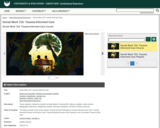
These materials, created by Jennifer Schanen-Materi in Spring 2024, feature a syllabus, video lectures, bibliographic references, assignment prompts, discussion questions, and links to library resources.
The topics covered in this course include: Trauma and the Philosophy of Trauma-Informed Care (TIC); Trauma-Informed Practice at the Micro Level; Trauma-Informed Practice at the Systems Level; Secondary Trauma & Self-Care
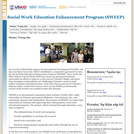
SWEEP là một tổ hợp quốc tế bao gồm Cơ quan hỗ trợ phát triển quốc tế Hoa Kỳ USAID, trường Đại học Bang San Jose SJSU, 8 trường đại học ở Việt Nam, các bộ ngành,Tập đoàn công nghệ mạng Cisco, các tổ chức cộng đồng và các bên liên quan khác. Mục đích của SWEEP là nhằm hỗ trợ 8 trường đại học của Việt Nam nâng cao chương trình đào tạo cử nhân CTXH.
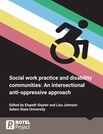
Given the high prevalence of disability worldwide, the status of disabled people remains an area of concern for practitioners who seek to respectfully engage with a stigmatized and often oppressed population. The book encourages practitioners to draw on intersectionality theory, the critical cultural competence framework and anti-oppressive practice approaches to contend with the concerns facing disabled people today. These issues include parenting, mass incarceration, ableism, aging and employment, among others. This title acknowledges difference and multisystemic privilege and oppression while also drawing readers’ attention to the importance of solidarity and allyship when it comes to meaningful social work practice with and social change for disabled people.
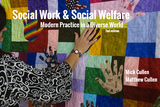
This text is intended for use in introductory social work classes at the college level. Chapter topics include the foundations and history of social work and social welfare; generalist social work; ethics and values; social policy; race & ethnicity; sex, sexism, & gender; LGBTQ+ clients; poverty and financial assistance; school social work; families and children; healthcare and disabilities; substance use; mental health; criminal justice; and older clients. Mick Cullen, LCSW, CADC, MA, is a professor and chair of the social work/human services department at College of Lake County in Grayslake, Illinois. Matthew Cullen, LICSW, LCSW, M.Ed., is a counselor at Green River College in Auburn, Washington.
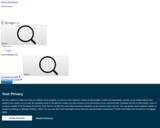
This is the first book on the intersection of the fields of social work, sociometry, and psychodrama. It provides an overview of integrated sociometry and psychodrama tools into practice. It also summarizes Moreno’s work on sociometry, psychodrama, and group psychotherapy Is an open access book
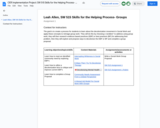
The goal is to create a process for students to learn about the decolonization movement in Social Work and apply these concepts to reimage group work. They will do this by choosing a “problem” to address using group work,
they will then research evidence based practices (EBP) or best practices (BP) for addressing their problem, then
they will explore and propose ways to decolonize the EBP or BP and complete a group proposal.
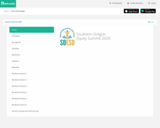
The event includes high-profile speakers and breakout sessions that provide strategies for understanding equity through a trauma-informed practices approach. The site will provide access to speaker keynotes and breakout session recordings and materials from both.
With consideration to current social movements in the U.S., as well as the recent advent of widespread distance learning, equity work is needed now more than ever. Our students deserve our highest-level of support.
Native Wellness Institute: Jillene Joseph
Communication Across Barriers: Dr. Donna Beagle
Ricky Robertson
Resolve: Raphaelle Miller, Cara Walsh
Oregon Center for Educational Equity; Daryl Dixon, Jesse Scott
John Krownapple
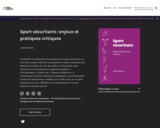
Short Description:
Combinant la recherche et la pratique sur le sport sécuritaire, ce livre électronique offre des commentaires actuels et judicieux qui abordent les points de vues des athlètes, l'histoire du sport sécuritaire et les perspectives organisationnelles et d'entraînement. Composé de 7 chapitres rédigés par 11 contributeurs de divers domaines académiques et professionnels, il offre des informations complètes et en libre accès sur le sport sécuritaire pour les individus et les organisations à tous les niveaux du système sportif.
Word Count: 42486
ISBN: 978-1-990208-10-2
(Note: This resource's metadata has been created automatically by reformatting and/or combining the information that the author initially provided as part of a bulk import process.)
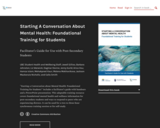
Facilitator’s Guide for Use with Post-Secondary Students
Short Description:
"Starting a Conversation about Mental Health: Foundational Training for Students" includes a facilitator’s guide with handouts and a PowerPoint presentation. This adaptable training resource covers foundational mental health and wellness information for post-secondary students and ways to respond to peers who are experiencing distress. It can be used for a two-to three-hour synchronous training session or for self-study.
Long Description:
Starting a Conversation about Mental Health: Foundational Training for Students includes a facilitator’s guide with handouts and a PowerPoint presentation. This adaptable resource covers foundational mental health and wellness information for post-secondary students and ways to respond to peers who are experiencing distress. It can be used for a two-to three-hour synchronous training session or for self-study. This resource has a decolonized perspective and was guided by the following principles: accessible, adaptable, culturally located, evidence-informed, inclusive, and trauma-informed. Handouts include a wellness wheel self-assessment tool, information on coping strategies, mental health resources, and scenarios and responses written by post-secondary students.
Word Count: 33363
(Note: This resource's metadata has been created automatically by reformatting and/or combining the information that the author initially provided as part of a bulk import process.)

Short Description:
"Starting a Conversation About Suicide: Foundational Training for Students" includes a facilitator’s guide with handouts and a PowerPoint presentation. This adaptable resource offers sensitive, respectful, and detailed training on suicide awareness and response. It can be used for a two- to three-hour synchronous session, and it can be offered by counsellors and other trained staff to post-secondary students interested in creating safe and supportive environments on their campuses.
Long Description:
Starting a Conversation About Suicide: Foundational Training for Students includes a facilitator’s guide with handouts and a PowerPoint presentation. This adaptable resource offers sensitive, respectful, and detailed training on suicide awareness and response. It was developed to reduce the stigma around suicide and to help students acquire the skills and confidence to ask if a peer is considering suicide, listen in a non-judgmental way, and refer them to appropriate resources. It can be used for a two- to three-hour synchronous session, and it can be offered by counsellors and other trained staff to post-secondary students interested in creating safe and supportive environments on their campuses. It was created to be accessible, adaptable, culturally located, evidence-informed, inclusive, and trauma-informed.
Word Count: 33760
(Note: This resource's metadata has been created automatically by reformatting and/or combining the information that the author initially provided as part of a bulk import process.)
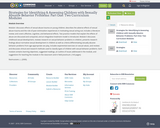
Module I discusses effects of sexual abuse trauma on young children; describes the adverse effects of sexual abuse trauma and the role of past victimization experiences in motivating sexual acting out; includes a literature review; and covers affective, cognitive, and behavioral effects. Two practice models that explain the effects of abuse are discussed and compared, and an integrative treatment model is introduced. Module II discusses childhood sexual development, reviews research on sexual behavior problems in children, presents research findings about normative sexual development in children as well as criteria differentiating sexually abusive behavior problems from age-appropriate sex play, includes experiential exercises on sexual values, and reviews and discusses clinical and research methods used to classify types of children with sexual behavior problems. Each module contains learning objectives, suggested readings, an outline of issues addressed in the module, and suggestions for teaching the module in the classroom and in field practicum. (143 pages)Rasmusssen, L. (2000).